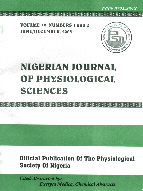
|
Nigerian Journal of Physiological Sciences
Physiological Society of Nigeria
ISSN: 0794-859X
Vol. 30, No. 1, 2015, pp. 95-101
|
 Bioline Code: np15014
Bioline Code: np15014
Full paper language: English
Document type: Research Article
Document available free of charge
|
|
|
Nigerian Journal of Physiological Sciences, Vol. 30, No. 1, 2015, pp. 95-101
| en |
Effects of Telfairia Occidentalis  Seed Oil on Female Reproductive Functions in Wistar Rats Seed Oil on Female Reproductive Functions in Wistar Rats
Oore-Oluwapo, I. Daramola1; Opeyemi, O. Akindele; Adeyombo, F. Bolarinwa & Yinusa, Raji
Abstract
The effects of T. occidentalis seed oil on some female reproductive indices were investigated in Wistar rats. The study was divided into two phases: (estrous cycle and pregnancy). Animals were grouped into four: group A received distilled water (control), groups B, C and D received 400, 600 and 800 mg/kg bw of T. occidentalis seed oil respectively. The pattern of estrous cycle was determined for three weeks before and during the treatment. Thereafter, each group was sub- divided into two. The sub-group-1 rats were mated with male breeders, the litter size and birth weight of their offsprings was determined. Sub-group-2 rats were sacrificed and histology of organs and serum levels of LH, FSH and estrogen were assayed. There was no significant difference between the pre-treatment and post-treatment estrous cycle length. However, there was a significant decrease in the frequency of diestrus phase during treatment in all the experimental groups when compared with pre-treatment period (p < 0.05) but there was no significant difference in the diestrus phase when compared with the control group. Serum estrogen concentration was significantly reduced (p < 0.05) in the group that was treated with 800 mg/kg bw of T. occidentalis seed oil. Histology of the ovary and uterus in the experimental groups were similar to that of the control group. Birth weight of pups was significantly increased in the group treated with 600 mg/kg bw of T. occidentalis seed oil when compared with the control group (p < 0.05). The results of this study suggest that T. occidentalis seed oil does not alter estrous cycle in Wistar rats.
Keywords
T. occidentalis; Wistar rats; Estrous cycle; diestrus; Estrogen
|
| |
© Copyright 2015 - Nigerian Journal of Physiological Sciences
|
|
